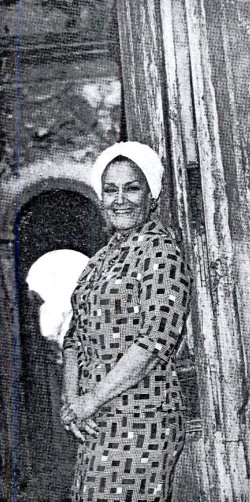|
Juanita Larrauri
Juana Larrauri de Abramí, also known as Juanita Larrauri (12 March 1910 – 21 February 1990) was a tango singer and was among a group of the first women elected to the Argentine Senate.[1][2][a] She was elected twice as a senator and in both cases lost her seat as a result of right-wing military coups; she was elected in 1951 and lost her seat in 1955, then was elected again in 1973 and lost her seat again in 1976.[2] Personal lifeShe was born in the Floresta neighborhood of Buenos Aires on 12 March 1910.[1][2] In 1949 she married pianist and orchestral director Francisco Rotundo.[1] She died in Buenos Aires on 21 February 1990 at the age of 79.[2] Singing careerIn 1931 Larrauri began her career as a tango singer on LR3 Radio Nacional (later called Radio Belgrano).[1] In 1936 she made her first record for Odeón.[1] Other radio stations on which she appeared included LS3 Radio Mayo, LS5 Radio Rivadavia, LS2 Radio Prieto and LR2 Radio Argentina.[1] With Peronism's rise to power in the 40s she postponed her singing career, but she was still featured in 1952 as the singer in "Evita Capitana" – a feminine hymn to Peronsim – by Rodolfo Sciamarella, and in 1972 she recorded an album titled Canto para mi pueblo.[1] She wrote the tango "La piba de mano a mano" (one of the tracks on this album) together with Tití Rossi.[1] Apart from her recordings and a few short tours in Argentina and neighboring countries, the bulk of her singing career was on radio.[1] Political lifeLarrauri joined a group of women that, led by Eva Perón, pushed the passing of the law giving women the right to vote, approved in 1947.[3] Larrauri joined the National Committee of Eva Perón's Women's Peronist Party (Partido Peronista Femenino, or PPF) as the representative of Entre Ríos Province.[2] Other members were Águeda Barro, Dora Gaeta, María Rosa Calviño, Amparo Pérez, and Delia Parodi.[4] In 1951 Larrauri was elected by the provincial legislature of Entre Ríos Province as one of its National Senators, joining a group of the first women to be elected to the Senate.[a] That same year Larrauri sang "Evita Capitana", which became the anthem of the Women's Peronist Party.[2] In 1952 she became the president of the Commission for the Eva Perón Monument.[2] She was deposed along with all the other elected representatives by a right-wing military coup (the Revolución Libertadora) on 16 September 1955, and was imprisoned by the resulting military dictatorship of Pedro Eugenio Aramburu.[5] During the ban of Peronism (1955–1972) Larrauri became a major leader in the women's branch of the movement known as the "Peronist Resistance".[6] When the ban on the Justicialist Party (Partido Justicialista) was lifted in 1972, she was a member of its Consejo Superior, representing the women's branch of the Peronist movement, which, at its core, took a position in opposition to Jorge Daniel Paladino.[7] In 1972 she was part of the delegation which accompanied Juan Perón on his return to Argentina.[8] In 1973 she was re-elected as a national senator, and on 24 March 1976 was again deposed along with the other elected representatives when a right-wing military dictatorship under Jorge Rafael Videla overthrew Isabel Perón in a coup d'état.[8] Discography
See alsoNotes and referencesNotesReferences
|
||||||||||||||||||||||||||||||
Portal di Ensiklopedia Dunia
